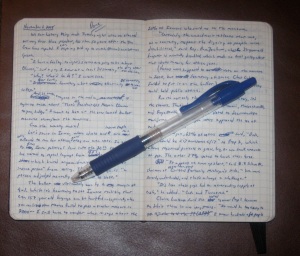This is a very debatable question. For me personally the answer is yes. Sometimes the best thing for me to do is to not write. That doesn’t mean I’m not thinking about it. Often I can be mulling plots and scenes over and over in my head. There are times when life does get in the way and writing simply cannot come first.
 When this happens, I deliberately put my pen down and stop. I believe there are times when we all need to do this. It doesn’t mean I put my pen down for days or weeks on end; just a little time out. The following outlines a few reasons why I do this.
When this happens, I deliberately put my pen down and stop. I believe there are times when we all need to do this. It doesn’t mean I put my pen down for days or weeks on end; just a little time out. The following outlines a few reasons why I do this.
First of all, I need to let my stories breathe. Whether I’ve finished a chapter or completed a whole work, I need to take a step back from it for a little while. It’s amazing what can be seen when you go back to it. Just putting a little distance between you and your words sheds incredible light.
Like many other writers, I also have other interests in my life and a day job that needs attending to. But it’s good to be able to focus on these others. By putting time and effort into something else, the cobwebs are still being cleared behind the scenes. Instinct always lets me know when it’s time to return.
Image my-moleskine.com
It’s also good for me to schedule a day off. We all have time off every week from our day jobs so why not writing? Having a day off, time out, allows the batteries to recharge thereby avoiding burn out.
How far can my mind expand? Some days not very far at all, other days way too much. Either way it can feel like it’s going to snap and break. Take the time to convalesce. Make yourself take a mini holiday, even if it’s only a weekend one. It’s also works wonders to step away from technology all together. Unplug for as long as you need. Get back to basics, get in touch with nature; sit in it, breathe it, see it, feel it. Taking a step back allows you and your story to breathe. Before you know it, you will feel refreshed, reenergised, and more than ready to tackle putting pen to paper again.
Image talkingwriting.com
So don’t be afraid to set your writing aside for a little while. It doesn’t mean you stop being a writer; it doesn’t mean you’ll never come back to it but sometimes it’s the best thing you can do for both yourself and all your future stories.



